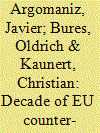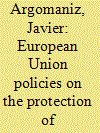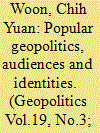|
|
|
Sort Order |
|
|
|
Items / Page
|
|
|
|
|
|
|
| Srl | Item |
| 1 |
ID:
136858


|
|
|
|
|
| Summary/Abstract |
In the shadow of one of Europe’s most sustained terrorist problems, Greece is entering a new era of radical left-wing politics. George Kassimeris explore the threat facing the country’s counter-terrorism agencies from the next generation of militant anarchists.
|
|
|
|
|
|
|
|
|
|
|
|
|
|
|
|
| 2 |
ID:
134457


|
|
|
|
|
| Summary/Abstract |
In this article, we assess the impact of counterterrorism measures on trade. Our work brings three value addition to the literature: (1) it develops a simple theory to emphasize the endogeneity between terrorism acts, counterterrorism measures, and trade; (2) it delivers an original strategy to identify empirically the effect of counterterrorism security measures on trade flows (using third country incidents); and (3) it uses a new data set on business visas issued by the United States to test further the hypothesis that terrorism is affecting trade through the security channel. Our results suggest that counterterrorism security measures matter for US imports. The level of the impact is up to three times higher when the acts result in a relatively high number of victims, when the products are sensitive to shipping time, or when they ask for networks and business people mobility in order to be sold.
|
|
|
|
|
|
|
|
|
|
|
|
|
|
|
|
| 3 |
ID:
136868


|
|
|
|
|
| Summary/Abstract |
This article critically examines the use and effectiveness of border controls in the European Union (EU)'s counter-terrorism policy. It shows that the EU has made substantial progress towards achieving the objectives that it had set for itself in this policy area, but has not managed to fulfil all of them, and certainly not by the deadlines originally set. It further argues that, contrary to their usual depiction in EU official documents, these border control measures make a limited contribution to the actual fight against terrorism, whilst having some negative effects. From that viewpoint, the fact that the EU has failed to meet all of its objectives in the use of border controls for counter-terrorist purposes may paradoxically be seen as a positive outcome.
|
|
|
|
|
|
|
|
|
|
|
|
|
|
|
|
| 4 |
ID:
136551


|
|
|
|
|
| Summary/Abstract |
China is a member of the Regional Counter-Terrorism Structure (RCTS), the security organ of the Shanghai Cooperation Organization (SCO). Given China’s issues with Uighur separatists, close relationship with other SCO members such as Russia, and bankrolling of expanded SCO projects in other areas, one might expect RCTS to be a hub of Chinese-backed security cooperation. Yet it is not so. RCTS has a tiny staff and budget, and lacks the bureaucratic muscle to actually implement most of its broad security mandate. The author argues that this is a consequence of China’s reticence and/or inability to contribute to international security at a level commensurate with its ballooning capabilities.
|
|
|
|
|
|
|
|
|
|
|
|
|
|
|
|
| 5 |
ID:
135988


|
|
|
|
|
| Summary/Abstract |
This article is a qualitative analysis of nation-state population “resiliency” to several spectacular and/or highly symbolic terrorist assaults that were watershed events. It draws heavily from qualitative comparative analysis (QCA) frameworks to isolate and identify the presence of what Goertz calls the “secondary dimensions” of a “primary concept” such as resiliency to terrorist assaults. In turn, the presence of those secondary dimensions and their strength presuppose and derive from “tertiary indicators” that are the basic metrics and concrete manifestations of those secondary dimensions. The nation-states under consideration include the London bombings of 2005, the United States for 9/11, the Madrid bombings of 2004, the first suicide bombings within pre-1967 boundaries of Israel, and the Russian Federation in the case of the 2002 terrorist assault against the Dubrovka Theater in Moscow. The results serve as the basis for the development of a “resiliency continuum” of nation-states where placement of those countries on the continuum reflect “nonresilient,” “semiresilient,” and “resilient” conditions, themselves defined by the number of secondary dimensions found in each case study. In the process, the analysis illuminates possible interconnections between “context specific” factors, such as a country’s historical experience with terrorism and population characteristics (e.g., education levels, degree of heterogeneity) to the resiliency or nonresiliency condition, and describes possible links between exogenous “systems factors” such as war and power ranking to the resiliency condition.
|
|
|
|
|
|
|
|
|
|
|
|
|
|
|
|
| 6 |
ID:
136863


|
|
|
|
|
| Summary/Abstract |
The Treaty on the European Union (EU) stipulates that one of the key objectives of the Union is to provide citizens with a high level of safety within an Area of Freedom, Security and Justice (AFSJ). Given that the fight against terrorism is a prominent aspect of this general objective, it is remarkable that, in spite of its political relevance and decade-long history, it has only relatively recently received due attention in the academic community.1 At the time of writing, only a handful of post-9/11 edited volumes and special issues have focused on specific aspects of the EU counterterrorism efforts2 and initial monographs on the subject have only been relatively recently published by the three editors behind this special issue: Argomaniz3 has produced a theoretically informed assessment of the coherence of the EU response, Bures4 has examined the extent to which the EU can offer an added value in the fight against terrorism in Europe and Kaunert5 has studied how counter-terrorism has been a driver in the process of construction of the EU's AFSJ.
|
|
|
|
|
|
|
|
|
|
|
|
|
|
|
|
| 7 |
ID:
134682


|
|
|
|
|
| Summary/Abstract |
This article reviews power transition theory and emerging threats to U.S. national security. It then analyzes how the 2014 QDR will ensure U.S. relative power decline and how the strategy fails to effectively counter the rise of China and Russia as challenger states in the international system. Finally, several policy options are proposed to address the deficiencies of the QDR and to counter an increasingly aggressive China and revisionist Russia.
|
|
|
|
|
|
|
|
|
|
|
|
|
|
|
|
| 8 |
ID:
136869


|
|
|
|
|
| Summary/Abstract |
During the first decade after the 9/11 attacks, the European Union (EU) has developed into an international counter-terrorism actor in its own right, a role increasingly accepted by third countries. This is a result of many influences, including a more favourable legal basis after the Amsterdam Treaty reforms; enhanced institutional capabilities, such as the growing importance of the Counter-Terrorism Coordinator; the use of a broad range of instruments, such as intelligence sharing; and the application of geopolitical priorities, guided by meetings at the United Nations and the Council of Europe (among other fora). At the same time, the EU's counter-terrorism role has remained subsidiary, both legally and politically, to that of its member states. Furthermore, a lack of its own operational capabilities, its institutional complexity, and its problems of cross-policy coordination continue to act as powerful constraints on the EU's counter-terrorism responsibilities.
|
|
|
|
|
|
|
|
|
|
|
|
|
|
|
|
| 9 |
ID:
136867


|
|
|
|
|
| Summary/Abstract |
The challenge of violent radicalization is an important part of (the Prevent pillar) of the 2005 EU Counter-terrorism Strategy and is specifically dealt with in the 2005 EU Strategy for Combating Radicalisation and Recruitment to Terrorism. This article assesses the EU counter-radicalization approach by comparing the above mentioned strategies and other policy documents to theoretical notions on radicalization and counter radicalization. It focuses on the comprehensiveness, implementation and consistency of the EU policies that aim to prevent individuals from turning to violence, while halting the emergence of the next generation of terrorists.
|
|
|
|
|
|
|
|
|
|
|
|
|
|
|
|
| 10 |
ID:
136870


|
|
|
|
|
| Summary/Abstract |
The Lisbon Treaty, which entered into force in 2009, considerably reinforced the powers of the European Parliament. This article examines to what extent the European Parliament has become an important actor in EU counter-terrorism by focusing on the external dimension of this policy. It also analyses the impact that this potentially changing role has had on the external dimension of EU counter-terrorism. This article puts forward two inter-related claims. Firstly, the role of the European Parliament in the external dimension of EU counter-terrorism has significantly grown in recent years. Following the entry into force of the Lisbon Treaty in December 2009, the European Parliament has become a fully-fledged actor in the external dimension of EU counter-terrorism. Secondly, the reinforcement of the role of the European Parliament has also led to a strengthening of both accountability and oversight in the external dimension of EU counter-terrorism, although there are still some limitations in that respect.
|
|
|
|
|
|
|
|
|
|
|
|
|
|
|
|
| 11 |
ID:
136866


|
|
|
|
|
| Summary/Abstract |
This article aims to provide an assessment of the evolution and contribution since 2001 of the European Union infrastructure and transport protection policies to the European fight against terrorism. Using the avowed goals of the Protect strand of the 2005 EU Counter-terrorism Strategy as a yardstick, the intention here is to evaluate the extent to which reality matches the aspirations present in the European political discourse and in particular the overall aim of ‘strengthen[ing] the defences of key targets, by reducing their vulnerability to attacks, and also by reducing the resulting impact of an attack’. In this way, special attention is paid to the outcomes from a number of initiatives in the field such as the European Programme for Critical Infrastructure Protection (EPCIP), the Critical Infrastructure Warning Information Network (CIWIN), the Action Plan for the Enhancement of the Security of Explosives, the directives and regulations on aviation and maritime security and others. Continuing the pattern set out by the other contributions in this issue, the objective is to assess the degree to which initiatives have led to practical results, the political and institutional factors that have facilitated the process of policy development and implementation, the obstacles that have stood in the way of the practical realization of the initial objectives and, finally, lessons learnt.
|
|
|
|
|
|
|
|
|
|
|
|
|
|
|
|
| 12 |
ID:
134933


|
|
|
|
|
| Summary/Abstract |
While it is commonly assumed that the United States uses foreign aid as an instrument to combat global terrorism, it is unclear whether it views terrorist threats to other countries, particularly its allies, with urgency. We show that the relationship between transnational terrorism and foreign aid flows is strongly conditional on whether terrorist activity based in a potential recipient directly threatens the United States. Using data on terrorist attacks and casualties in potential recipient countries, we demonstrate that terrorist activity based within a state’s borders, which targets US interests is a strong determinant of both whether that state receives any aid and also how much aid it receives. In contrast, the presence of terrorism targeted at non-US interests, even if it targets formal allies of the United States, is generally unrelated to US aid allocation. These findings suggest that the United States' use of foreign aid to fight terrorism and political violence is narrowly tailored to assist countries that directly threaten its own security, rather than those of other countries, even its allies.
|
|
|
|
|
|
|
|
|
|
|
|
|
|
|
|
| 13 |
ID:
137054


|
|
|
|
|
| Summary/Abstract |
In a series of reports and meetings in Spring 2011, intelligence analysts and officials debated the chances that Osama bin Laden was living in Abbottabad, Pakistan. Estimates ranged from a low of 30 or 40 per cent to a high of 95 per cent. President Obama stated that he found this discussion confusing, even misleading. Motivated by that experience, and by broader debates about intelligence analysis, this article examines the conceptual foundations of expressing and interpreting estimative probability. It explains why a range of probabilities can always be condensed into a single point estimate that is clearer (but logically no different) than standard intelligence reporting, and why assessments of confidence are most useful when they indicate the extent to which estimative probabilities might shift in response to newly gathered information.
|
|
|
|
|
|
|
|
|
|
|
|
|
|
|
|
| 14 |
ID:
135371


|
|
|
|
|
| Summary/Abstract |
In May 2009, Lieutenant Mark Evison, of the 1st Battalion Welsh Guards, was shot in the shoulder during an ambush on his platoon while on patrol in the Nad-e Ali district of Helmand Province, Afghanistan. Three days later, having first been flown to Camp Bastion for emergency surgery and then to the UK for further treatment, he was declared brain dead and his family switched off his life-support machines. In this article, Lieutenant Evison's mother provides a very personal reflection on the extremely difficult period following his death, recalling her impressions of the support provided to the platoon members, and the legal process that followed in the form of the coroner's inquest.
|
|
|
|
|
|
|
|
|
|
|
|
|
|
|
|
| 15 |
ID:
134650


|
|
|
|
|
| Summary/Abstract |
The inter-organizational lesson in the fight against terrorism has been clearly identified after 9/11, but not completely learned and applied. Horizontal cooperation and coordination structures have been established, yet due to many challenges they do not function optimally. This article reaches beyond the prevailing mantra concerning the need for inter-organizational cooperation in the fight against terrorism by providing a framework for understanding the complexity of network counterterrorism and the relevant challenges. It introduces four levels of complexity that must be comprehended in order to ensure an optimal and comprehensive strategic approach in this fight. Based on this, it argues that a successful counterterrorism strategy needs to provide capacities for multi-organizational, inter-organizational and network-horizontal cooperation, and the capacity to manage many related inter-organizational challenges. The conclusions also suggest that our societies are still not conceptually and practically ready to embrace a truly comprehensive network approach to a networked threat. The inter-organizational approach in the fight against terrorism is ultimately what organizations make of it.
|
|
|
|
|
|
|
|
|
|
|
|
|
|
|
|
| 16 |
ID:
134476


|
|
|
|
|
| Summary/Abstract |
When it comes to anticipating terrorism, do recent technological advancements fundamentally change the modus operandi of intelligence services? Recent scholarship has focused on the new modes of reasoning brought about by ‘hi-tech’ forms analysis such as data mining, graph visualization and the algorithmic treatment of big data. While this article recognizes the increasing influence of these techniques, it argues they should not overshadow much more low-tech modalities through which a large part of counterterrorism work takes place. Low-tech counter-terrorism, based on qualitative methods and conjectural reasoning, still matters. Drawing on the case of French domestic intelligence services and based on qualitative interviews, observations and declassified documents, this article shows that the practices of security professionals, rooted in traditional institutional habituses developed over time, are largely in continuity with previous ‘low-tech’ forms of police work. In a context in which the uses of digital security technologies have generated discussions about politics and ethics, this article suggests that traditional techniques of intelligence gathering and processing therefore still merit a great amount of attention.
|
|
|
|
|
|
|
|
|
|
|
|
|
|
|
|
| 17 |
ID:
135367


|
|
|
|
|
| Summary/Abstract |
Operation Serval, the eighteen-month mission mounted by France to oust jihadists from northern Mali, came to an end in August 2014. However, despite the transition into a broader, region-wide operation to counter terrorism, both UN and French troops remain focused on securing Mali and targeting jihadists still operating within the country's borders. Sergei Boeke and Antonin Tisseron warn against the temptation to treat the jihadists as a homogenous group with common goals and modi operandi, instead highlighting the multiple fractures within the myriad, smaller factions that must be addressed if stability is to be restored to Mali.
|
|
|
|
|
|
|
|
|
|
|
|
|
|
|
|
| 18 |
ID:
134591


|
|
|
|
|
| Summary/Abstract |
The invasion of northwestern Iraq by the Sunni-extremist Islamic State of Iraq and the Levant (ISIL or ISIS) and the subsequent mobilization of Shia militias mark the latest challenge in Iraq's ongoing struggle to forge long-term stability. The primary driver of this crisis is not stagnating socioeconomic development or an acute lack of services, prominent issues in other countries in the region. Rather, it is a sectarian divide widened by political jockeying over national power sharing, and executive-level provocation of Iraq's Sunnis through opaque arrest campaigns and heavy-handed dispersals of protests. While ISIL's incursion reflects a confluence of political deficiencies and security fragility, the long-term solution to these challenges cannot be similarly confined to immediate military or political remedies. The government will not recover without undertaking steps towards reconciliation, through inclusive reforms, as well as maintaining and improving functionality for all of its citizens.
|
|
|
|
|
|
|
|
|
|
|
|
|
|
|
|
| 19 |
ID:
134478


|
|
|
|
|
| Summary/Abstract |
Islamist extremism through al-Shabaab is increasing its foothold in Kenya. In contrast to the common perception—as depicted through government responses—radicalization and recruitment extends well beyond Somali and Kenyan–Somali nationals. Instead of exclusively focusing on external or environmental factors, the study on which this article is based analyzed the personal background of those being radicalized. This article will focus on the role the family and peers play in the political socialization process while analyzing factors influencing radicalization, most notably religious identity, economic, political, and educational background of al-Shabaab members. Based on interviews with al-Shabaab and family members the last part of the article evaluates when, why, and how respondents joined al-Shabaab. Through answering these key questions the Kenyan government and other agencies assisting in preventing radicalization can develop more effective counterradicalization and counterterrorism strategies based on empirical evidence
|
|
|
|
|
|
|
|
|
|
|
|
|
|
|
|
| 20 |
ID:
134633


|
|
|
|
|
| Summary/Abstract |
Audience research has traditionally been neglected within the subfield of popular geopolitics. However in recent years, geographers are increasingly focusing on the making of geopolitical meanings by audiences as they consume popular culture and related texts. Drawing on recent assemblage thinking in geopolitics, this paper argues that audiences form part of the animators of a network that links the human body with places, environments, objects and discourses related to geopolitics. By investigating Filipinos’ critical readings of and engagements with the ‘war on terror’ in Mindanao as represented through the national newspaper, the Philippines Daily Inquirer, the agency and power of audiences in the creative enactments of geopolitics and geography are illuminated. As such, understanding the complex interactions between popular media and its audiences can prove useful in casting insights into the everyday, geopolitical ‘playing out’ of issues of terrorism, violence and peace in the Philippines context and beyond.
|
|
|
|
|
|
|
|
|
|
|
|
|
|
|
|
|
|
|
|
|